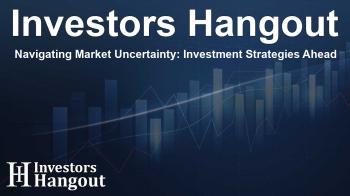Navigating Market Uncertainty: Investment Strategies Ahead

Understanding Market Volatility and Its Effects
There's an ongoing fascination with how nuanced understandings can sometimes elude even the most knowledgeable finance professionals. For instance, many financial advisors recognize that bonds generally showcase less volatility compared to stocks. They also understand that incorporating both stocks and bonds into a portfolio is advantageous due to their lack of correlation. Moreover, experienced financial professionals and CTAs acknowledge that the act of diversifying a portfolio leads to a reduced risk profile since when uncorrelated assets are added, the overall risk becomes less than the sum of individual risks thanks to correlation effects. Yet, many might overlook the pivotal detail that this correlation can shift significantly when inflation crosses a certain threshold, thus presenting additional risk for a given combination of assets.
Current Market Environment and Political Influences
In light of the current political climate, the conversation around market volatility is particularly timely. Observations about President Trump’s unique approach to governance hint at an uptick in market volatility compared to previous administrations. The question then arises: how does this heightened volatility reshape our understanding of asset allocation? Investors who are not accustomed to intricate financial details might still grasp that an increase in market uncertainty—especially one that seems aligned with a more Machiavellian global strategy—could lead to changes in investment preferences.
Modern Portfolio Theory Explained
The principles of Modern Portfolio Theory (MPT) emphasize balancing portfolios to minimize risk while maximizing returns. The efficient frontier illustrates this relationship, indicating how different asset combinations can yield the least amount of risk for an expected return. For instance, as you approach higher expected returns by investing heavily in equities, diversification allows you to manage risks, ensuring a portfolio can typically outperform any single asset in terms of returns per unit of risk.
The Impact of Increased Risk on Asset Allocation
As asset risks escalate—and in our current climate, this is not merely speculative—the entire efficient frontier shifts. When it becomes apparent that overall market risk is on a permanent rise, savvy investors are likely to reassess their strategies, moving toward less risky asset allocations. This phenomenon follows a basic principle: if the risk of the market increases, it is logical for investors to seek to reduce their overall exposure to risk. Consequently, if there is a widespread perception that the political environment is cultivating volatility, equity investments may suffer as investors seek safer havens.
The Role of Economic Policy Uncertainty
Indicators like the Economic Policy Uncertainty Index underscore the prevailing apprehension in markets. This index quantifies the frequency of articles discussing economic unpredictability within major news outlets. Notably, significant spikes in this index historically align with tumultuous periods in the financial landscape, such as after the dot-com bubble, the global financial crisis, and the recent pandemic. The rise in uncertainty associated with President Trump’s policies also reflects this type of volatility, lending credence to the notion that investors might adopt a more cautious posture.
Investment Decisions in Uncertain Times
What does all this mean for investors? With the specter of increased volatility looming large, it may be wise for them to evaluate their positions critically. While volatility can represent opportunity, it often leads to hesitation. This duality makes decision-making complex in turbulent conditions. Investors accustomed to robust growth may find themselves rethinking their strategies, focusing instead on preservation of capital or seeking out less aggressive investment vehicles. The conclusion here is that market volatility, especially when perceived as a long-term condition, inevitably prompts a reevaluation of risk tolerance across the board.
Frequently Asked Questions
How does market volatility affect asset allocation?
Market volatility often leads investors to reassess their risk tolerance and potentially shift towards more conservative asset allocations to mitigate risks.
What is Modern Portfolio Theory (MPT)?
MPT is a financial theory that advocates for the construction of portfolios that optimize expected returns by balancing expected risk.
Why is economic policy uncertainty significant for investors?
Economic policy uncertainty is a crucial factor because it can precede market instability, prompting investors to become more cautious with their investments.
What factors might increase market volatility?
Political changes, economic downturns, and unexpected global events can all contribute to heightened market volatility.
What strategies should investors consider during volatile periods?
During volatile periods, investors may benefit from diversifying their portfolios and reallocating towards safer assets to protect invested capital.
About The Author
Contact Ryan Hughes privately here. Or send an email with ATTN: Ryan Hughes as the subject to contact@investorshangout.com.
About Investors Hangout
Investors Hangout is a leading online stock forum for financial discussion and learning, offering a wide range of free tools and resources. It draws in traders of all levels, who exchange market knowledge, investigate trading tactics, and keep an eye on industry developments in real time. Featuring financial articles, stock message boards, quotes, charts, company profiles, and live news updates. Through cooperative learning and a wealth of informational resources, it helps users from novices creating their first portfolios to experts honing their techniques. Join Investors Hangout today: https://investorshangout.com/
The content of this article is based on factual, publicly available information and does not represent legal, financial, or investment advice. Investors Hangout does not offer financial advice, and the author is not a licensed financial advisor. Consult a qualified advisor before making any financial or investment decisions based on this article. This article should not be considered advice to purchase, sell, or hold any securities or other investments. If any of the material provided here is inaccurate, please contact us for corrections.

